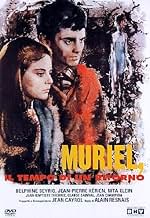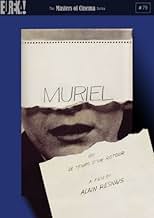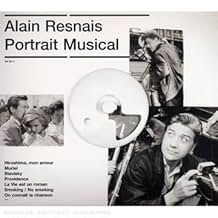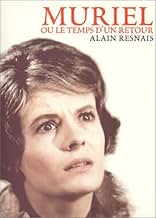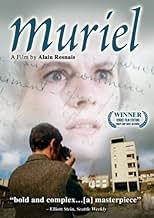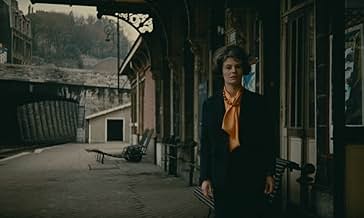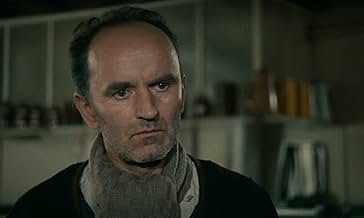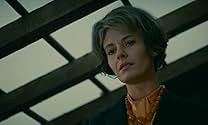AVALIAÇÃO DA IMDb
7,0/10
4 mil
SUA AVALIAÇÃO
Adicionar um enredo no seu idiomaIn the seaside town of Boulogne, no one seems to be able to cope with their past, least of all Hélène, an antique furniture saleswoman, her stepson Bernard, and her former lover Alphonse.In the seaside town of Boulogne, no one seems to be able to cope with their past, least of all Hélène, an antique furniture saleswoman, her stepson Bernard, and her former lover Alphonse.In the seaside town of Boulogne, no one seems to be able to cope with their past, least of all Hélène, an antique furniture saleswoman, her stepson Bernard, and her former lover Alphonse.
- Prêmios
- 3 vitórias e 3 indicações no total
Jean-Baptiste Thiérrée
- Bernard Aughain
- (as Jean-Baptiste Thierrée)
Wanda Kerien
- La cliente
- (as Wanda Kérien)
Avaliações em destaque
Muriel is a riddle. It may just have been the first art-house movie I ever saw. It was on local TV one day when I was about 18 maybe and I left it on because I was studying French and had been told to watch French movies. I found myself amazed and dumbfounded by the jump-cuts and seeming lack of continuity between scenes.
Today, 12 years later or so I've finally seen the whole thing and I feel like I saw a completely different movie to the one I saw last time. I feel I understand who the characters are, what the central mystery is, but I understand very little of the minute by minute goings on of where characters are moving and why. I feel this is a film that intentionally tries to disorient you constantly. Just as you are becoming comfortable in a scene, it will switch completely and never return. It reminds me of a perfectly normal film about four characters and their interrelations that has been sliced up and then recreated anew in the editing room. The characters make reference to dreams and memory, but on this viewing I didn't see it as necessarily a recreation of those things, but as a depiction of disorientation.
I found the newsreel section in the middle, which I don't at all remember seeing 12 years ago, particularly important addition, and the whole thing is just as refreshing as it ever was.
Today, 12 years later or so I've finally seen the whole thing and I feel like I saw a completely different movie to the one I saw last time. I feel I understand who the characters are, what the central mystery is, but I understand very little of the minute by minute goings on of where characters are moving and why. I feel this is a film that intentionally tries to disorient you constantly. Just as you are becoming comfortable in a scene, it will switch completely and never return. It reminds me of a perfectly normal film about four characters and their interrelations that has been sliced up and then recreated anew in the editing room. The characters make reference to dreams and memory, but on this viewing I didn't see it as necessarily a recreation of those things, but as a depiction of disorientation.
I found the newsreel section in the middle, which I don't at all remember seeing 12 years ago, particularly important addition, and the whole thing is just as refreshing as it ever was.
"Muriel" (1963) directed by Alain Resnais is a drama about the persistence of memory (aren't all Resnains' films? Incidentally, I named my review of "Hiroshima Mon Amour" that I saw about two years ago, "Persistence of Memory".)
Muriel of the title is dead by the time the movie begins, the victim of torture by the French soldiers during the occupation of Algeria. One of the soldiers, Bernard, is back in France living with his step-mother, Helene (Delphine Seyrig) in the province city Boulogne and hunted by the memories of war and Muriel. Helen deals with her own past and memories of Alphonse (Jean-Pierre Kérien), an ex-lover who comes from Paris to visit her in the company of his new 20-years-old girlfriend, Françoise (Nita Klein)
The story which Resnais tells is simple and the trailer for the movie gives a viewer a very good idea of what they are about to see: The Past. The present. The future - is it possible? Uncertainty. Suspicions. Lies. Four main characters, Helene, Alphonse, Bertrand, and Françoise are in search of what they are. There will be secrets and confessions. Is that time to love? The main theme of the film is reality vs. memory of it. Can we always trust ourselves with what we remember? Does our memory reflect the events the way they really happened or our vision of them is altered as time passes and new realities inevitably enter our lives?
What makes "Muriel" unique after all these years is the way the director presents the journey into the past of his characters, how they see it, and how it affects their present lives and the possibility (or rather impossibility) of love and happiness. Alain Resnains uses quick flashes of memory in the form of almost hypnotizing jump cuts of his genius cinematographer Sacha Vierny (Resnains and Vierny had made 10 films together). Vierny provided beautiful melancholic visual palette of washed out colors that created the atmosphere of unbearable sadness, loss, and hopelessness. Vierny who always underlined his preference for atmosphere over formal perfection, had said, "My satisfaction is that the photography is not remarked on too much for itself". The visual originality and innovation are accompanied by unusual unnerving soundtrack, eerie and haunting that adds to the understanding of guilt and remorse the film characters live with.
"Muriel" is a puzzling and multi-layered film that is easy to admire and meditate on. It is not entertaining or heart-warming and it is hard to identify with its heroes (or anti-heroes) but is always fascinating and rewarding and it may reveal its secrets after multiple viewings.
Muriel of the title is dead by the time the movie begins, the victim of torture by the French soldiers during the occupation of Algeria. One of the soldiers, Bernard, is back in France living with his step-mother, Helene (Delphine Seyrig) in the province city Boulogne and hunted by the memories of war and Muriel. Helen deals with her own past and memories of Alphonse (Jean-Pierre Kérien), an ex-lover who comes from Paris to visit her in the company of his new 20-years-old girlfriend, Françoise (Nita Klein)
The story which Resnais tells is simple and the trailer for the movie gives a viewer a very good idea of what they are about to see: The Past. The present. The future - is it possible? Uncertainty. Suspicions. Lies. Four main characters, Helene, Alphonse, Bertrand, and Françoise are in search of what they are. There will be secrets and confessions. Is that time to love? The main theme of the film is reality vs. memory of it. Can we always trust ourselves with what we remember? Does our memory reflect the events the way they really happened or our vision of them is altered as time passes and new realities inevitably enter our lives?
What makes "Muriel" unique after all these years is the way the director presents the journey into the past of his characters, how they see it, and how it affects their present lives and the possibility (or rather impossibility) of love and happiness. Alain Resnains uses quick flashes of memory in the form of almost hypnotizing jump cuts of his genius cinematographer Sacha Vierny (Resnains and Vierny had made 10 films together). Vierny provided beautiful melancholic visual palette of washed out colors that created the atmosphere of unbearable sadness, loss, and hopelessness. Vierny who always underlined his preference for atmosphere over formal perfection, had said, "My satisfaction is that the photography is not remarked on too much for itself". The visual originality and innovation are accompanied by unusual unnerving soundtrack, eerie and haunting that adds to the understanding of guilt and remorse the film characters live with.
"Muriel" is a puzzling and multi-layered film that is easy to admire and meditate on. It is not entertaining or heart-warming and it is hard to identify with its heroes (or anti-heroes) but is always fascinating and rewarding and it may reveal its secrets after multiple viewings.
Some decades before Haneke's 'Cache' once more centralised the trope of Algeria-guilt amongst the bourgeoisie, 'Muriel' is less a polemical allegory-and less marked by immigrant experience-and more a kind of spider's web of implication, its critique of French conduct in Algeria constructed as a kind of puzzle which is only really a puzzle if we ignore those political truths hiding in plain sight-which is precisely the point. Haneke is concerned to reveal his cards half-way through the film-it's important that one *get* and *absorb* a message. Likewise, in Muriel, the account of torture committed by the ex-soldier now returned to Boulogne-sur-Mer plays out at the half-way point. But for Resnais and scriptwriter Jean Cayrol, to whom the film equally owes its striking detail and shape, form and message are imbricated in closer ways. Likewise, compared to other experiments with narrative within avant-garde cinema of the period-including Resnais' own-here, complexities of perception rendered through avant-garde technique may reflect existential questions of memory, desire and so on, but more precisely, they serve a political purpose. As in Demy's Parapluies de Cherbourg the following year, the film's critique of French conduct in Algeria is presented as both motor to and peripheral figure / irritant within what is in some ways a love story. But there are no Michel Legrand songs here, no bright-burning neon glow, no dwelling in sentiment: the film is analytical, critical, clipped, dense. The constructs of desire, loss, the attempt to regain past intimacy, told in half-finished stories, never-received letters, interrupted monologues, the constant unspoken-the evasions and illusions of romantic love-are open secrets around which the lovers tip-toe, traipse and on which they trample, while the Algerian conflict is imbricated within the social fabric of a particular town, and, metonymically, the broader society in which it has its place. Of particular interest for the film is the way that the community of that town is constructed through a mixture of the repressed memory of trauma (the second world war and national service in Algeria-attack by or complicity with fascist occupation domestically and participation in colonial violence abroad), the militarist underlay of the business world, of Gaullism, of particular modes of masculine identity. The clipped precision of the film's extreme fast-cutting turns editing at once almost hallucinatory in its flashes of distorted logic and extraordinarily precise in its planned juxtapositions: the trope of mystery-who is Muriel? What happened in Algeria? What happened to break apart the now elderly lovers reunited in a web of half-truths, half-desires, and deceit?-a diagnostic frame at once personal and social. Resnais may suggest that film itself-at least, as conceived of as a repository of direct truth, the authenticity of visual experience-is inadequate: as when the young ex-soldiers' Algerian footage literally burns up in the projector when exposed to the light. But film, understood differently-for its challenge to, its going against the grain of perception-provides the shock to the habituated dailiness of looking so that an antique table, the door to a café, a walk around town, the assassination of a far-right terrorist, flicker and bunch up together like a terrible revelation of what lies beneath.
Resnais is one of the seven sages of cinema, perhaps even one of the most important ones. Within him we find others, like Godard and Marker, who inherited the problems he first posited with clarity of vision and eloquence of mood. Problems of memory, firstly how the past forms manifest in consciousness and synthesize an illusionary space which we then inhabit (in itself a poignant inspection of the mechanisms of cinema), more importantly what these past forms are, which we understand as the self and identity, and how they trap us in meaningless dilemmas.
His astounding contribution to this field, is in how he brilliantly envisions this space by means of a visual vocabulary and how he articulates within it. The museum in Hiroshima (which reappears here again, as homage), the hotel in Marienbad.
We find the wandering of memory again in Muriel, in a form a tad less inspired this time than those films.
Passions past and present, which defined the participants as persons and left indelible marks on their souls, we see how they appear again after time. We see these people use memory as the only means of reliving time, of painfully trying to claim again the ethical vindication that escaped them the first time. How this past, projected in their minds, appears again around them to trap them anew. And we see how, their lives stifled as a result of those past anxieties, the memory of these things points at no way out.
The characters in this are fittingly restless, always rushing particularly nowhere, actually running from things they won't admit. Running perhaps against all hope that they will face them again. Moments of reflection are burdened with half-remembered sadness, while life outside continues indifferently.
Entire scenes of this play out as they would in ordinary melodrama, then the narrative seems to break down for a time. Virtually recalling fragments of images and conversations which mean nothing, we become privy to the destructive powers of memory. We actually experience the disorientation as part of the movie.
But Muriel lacks something in comparison to those other films. Perhaps it's the political angle (re the Algiers conflict and how it resonates in a complacent French bourgeois society), which in previous Resnais films is quietly buried underneath, dormant and supine, yet here greets us upfront, often violently demanding our discourse. Perhaps it's the pastel color palette, that may had been intented to invoke the contours of melodrama whose tropes the movie rearranges, but renders the film now a relic of the times.
Nonetheless Resnais here gives us an important realization. How we spend the present moment reliving past sufferings or anticipating the future with fear or hope, allowing these chimeras of the mind, born of desire, to cloud our soul, to disrupt our contact with the world. He gives us this not as a grave speech, something Bergman would do who was impotent in the face of suffering, but in the form of a merry jingle, which one character playfully recites after a dinner gathering, as a way of reminding us how trivial and unimportant these past or future fears are.
His astounding contribution to this field, is in how he brilliantly envisions this space by means of a visual vocabulary and how he articulates within it. The museum in Hiroshima (which reappears here again, as homage), the hotel in Marienbad.
We find the wandering of memory again in Muriel, in a form a tad less inspired this time than those films.
Passions past and present, which defined the participants as persons and left indelible marks on their souls, we see how they appear again after time. We see these people use memory as the only means of reliving time, of painfully trying to claim again the ethical vindication that escaped them the first time. How this past, projected in their minds, appears again around them to trap them anew. And we see how, their lives stifled as a result of those past anxieties, the memory of these things points at no way out.
The characters in this are fittingly restless, always rushing particularly nowhere, actually running from things they won't admit. Running perhaps against all hope that they will face them again. Moments of reflection are burdened with half-remembered sadness, while life outside continues indifferently.
Entire scenes of this play out as they would in ordinary melodrama, then the narrative seems to break down for a time. Virtually recalling fragments of images and conversations which mean nothing, we become privy to the destructive powers of memory. We actually experience the disorientation as part of the movie.
But Muriel lacks something in comparison to those other films. Perhaps it's the political angle (re the Algiers conflict and how it resonates in a complacent French bourgeois society), which in previous Resnais films is quietly buried underneath, dormant and supine, yet here greets us upfront, often violently demanding our discourse. Perhaps it's the pastel color palette, that may had been intented to invoke the contours of melodrama whose tropes the movie rearranges, but renders the film now a relic of the times.
Nonetheless Resnais here gives us an important realization. How we spend the present moment reliving past sufferings or anticipating the future with fear or hope, allowing these chimeras of the mind, born of desire, to cloud our soul, to disrupt our contact with the world. He gives us this not as a grave speech, something Bergman would do who was impotent in the face of suffering, but in the form of a merry jingle, which one character playfully recites after a dinner gathering, as a way of reminding us how trivial and unimportant these past or future fears are.
This movie was made in the context of the revolution in the French cinema and novel which took place in the sixties. Just like the work of Margueritte Duras and Claude Simon whose novels avoided a straightforward narrative style, this movie tells its story in an episodic and almost surreal manner.
This can make it difficult going for anyone seeking a simple tale, well told. But, if your taste runs to the more abstract, there is a lot to like here. Like "Juliet of the Spirits" this movie is infused with an intensely subjective portrayal of the story which unfolds of a betrayed love, an act of war time atrocity, and the desparate plight of a compulsive gambler.
Excellent cinematography and direction make this movie a wonderful and richly textured work which deserves several viewings to appreciate completely.
This can make it difficult going for anyone seeking a simple tale, well told. But, if your taste runs to the more abstract, there is a lot to like here. Like "Juliet of the Spirits" this movie is infused with an intensely subjective portrayal of the story which unfolds of a betrayed love, an act of war time atrocity, and the desparate plight of a compulsive gambler.
Excellent cinematography and direction make this movie a wonderful and richly textured work which deserves several viewings to appreciate completely.
Você sabia?
- CuriosidadesAt a press conference at the Venice Film Festival in 1963, Alain Resnais said that his film depicted "the malaise of a so-called happy society. ...A new world is taking shape, my characters are afraid of it, and they don't know how to face up to it."
- ConexõesFeatured in Whiplash: Em Busca da Perfeição (2014)
Principais escolhas
Faça login para avaliar e ver a lista de recomendações personalizadas
- How long is Muriel?Fornecido pela Alexa
Detalhes
- Tempo de duração1 hora 52 minutos
- Mixagem de som
- Proporção
- 1.66 : 1
Contribua para esta página
Sugerir uma alteração ou adicionar conteúdo ausente


